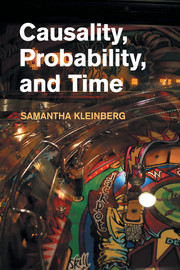5 - Inferring Causality
Published online by Cambridge University Press: 05 December 2012
Summary
Thus far, I have discussed the types of causes that will be identified, how they can be represented as logical formulas, and how the definitions hold up to common counterexamples. This chapter addresses how these relationships can be inferred from a set of data. I begin by examining the set of hypotheses to be tested, the types of data one may make inferences from, and how to determine whether formulas are satisfied directly in this data (without first inferring a model). Next, I discuss how to calculate the causal significance measure introduced in the previous chapter (ϵavg) in data, and how to determine which values of this measure are statistically significant. I then address inference of relationships and their timing without prior knowledge of either. The chapter concludes by examining theoretical issues including the computational complexity of the testing procedures.
Testing Prima Facie Causality
Chapter 4 introduced a measure for causal significance and showed how probabilistic causal relationships can be represented using probabilistic temporal logic formulas. This representation allows efficient testing of arbitrarily complex relationships. In this chapter, I adapt standard PCTL model checking procedures to validate formulas directly in a set of time series data without first inferring a model (as this can be computationally complex or infeasible in many cases).
- Type
- Chapter
- Information
- Causality, Probability, and Time , pp. 111 - 141Publisher: Cambridge University PressPrint publication year: 2012

